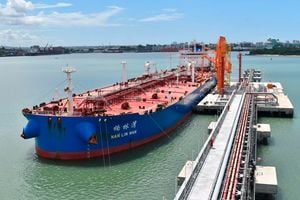
Collections from a levy meant to discourage the use of kerosene to adulterate diesel and super petrol fell to the lowest level last year.
Consumers in Kenya and neighbouring countries paid billions of shillings in additional cost of petroleum products under the government-to-government (G-to-G) oil deal that inflated the price of fuel compared to the previous supply system on which it was modelled.
The additional burden was introduced by increasing the premium charged by the oil importers compared to what was collected under the open tender system (OTS), the Auditor-General Nancy Gathungu said in a review of the G-to-G cost structure.
The new oil purchase deal started in March last year, with the government saying it would help ease the demand for the US dollars and ultimately stabilise the local currency.
But the unexplained premium increase saddled consumers with additional costs, a move that saw Uganda protest the mark-up and take measures to purchase petroleum products through Tanzania.
In the G-to-G agreement, the cost of the products has three components, namely the free-on-board (FOB) price, freight and premium.
“Further, the premium charged comprising $97.50, $114.25 and $118.00 for motor super petroleum (commonly known as super petrol), Jet A-1 and automotive gas oil (commonly known as diesel) respectively, were higher than those charged under the previous OTS,” the Auditor-General said in the report of the audit of the national government and its agencies in the fiscal year ended June 2023.
“It was not clear why the premium was included in the framework agreement with the supplier, the basis for the premium set, and whether the input of the buyer was sought before the premium amount was set.”
The Auditor-General further reported that her office was blocked from reviewing the details of the agreements that Kenya signed with the United Arab Emirates and the three oil marketers Gulf Energy, Galana Energies and Oryx Energies.
Changes were made in the fuel importation line-up in December last year when Oryx Energies was replaced with Asharami & One Petroleum at the behest of oil giant Saudi Aramco. No explanation was given for the substitution.
The high value and huge quantities of petroleum products consumed in the country indicate that consumers are saddled with billions of shillings in extra costs on account of the premium inflation in the controversial G-to-G deal which the government intends to terminate once the current agreement expires at the end of this year.
The Treasury recently told the International Monetary Fund (IMF) that the G-to-G fuel import deal has created distortions in the currency market, defeating the purpose for which it was established.
The Auditor-General said, for instance, that the contracted and projected monthly supply of super petrol alone is 930,000 tonnes.
This indicates that the premium charged on this commodity alone is 90.67 million per month (Sh13.1 billion) or $1.08 billion (Sh157 billion) per annum based on the rate of $97.5 (Sh14,175) per tonne.
The report did not say what the premium was under the OTS system.
Besides the costs arising from the inflation of the premium, consumers paid more to meet the funding shortfall in the new fuel supply deal.
The Auditor-General noted that at the start of August 2023, the Treasury had already asked the Energy and Petroleum Regulatory Authority (Epra) to pass over costs as a result of funding shortfalls to consumers at the pump. The shortfalls had hit Sh115.5 million by August 1, 2023.
“In addition, it was noted that a communication from The National Treasury to the Director-General, Energy and Petroleum Regulatory Authority on August 1, 2023 indicated that a shortfall of $810,531.81 (Sh115,522,262 at the exchange rates of that time) had been realised in respect of a consigned vessel under the G-to-G arrangement,” the report said.
“The communication advised that the shortfall, and any other shortfall arising in the future, should be factored in petroleum pump price as a prudent cost in accordance with the tripartite agreement signed between Ministry of Energy and Petroleum, KCB Bank and the nominated oil marketing companies.”
The report also revealed that Kenya did not nominate importers of the bulk petroleum products as agreed in the G-to-G Memorandum of Understanding (MoU), and that the Auditor-General was not provided with documents to support the existence of an escrow account used for receipt of funds from oil importers.
“However, documents supporting the existence of the account and amounts deposited and withdrawn from the account were not provided for audit review. In addition, the Letter of Support to importers provided for operation of a collection account and investment account.
However, no documents were provided to indicate existence, ownership, signatories and particulars of the accounts,” the report said.
The audit also found that the aggregate supply qualified for all importers amounted to 730,000 metric tonnes per month, against the assessed national requirement of 950,000 metric tonnes and no details of how the supply shortfall of 220,000 metric tonnes would be met.
The Auditor-General remarked that based on the evaluation of documents provided during the audit, an in-depth audit would be carried out on importation of petroleum products for the local and transit markets under the G-to-G arrangement.
In the circumstances, the lawfulness, and effectiveness of the oil importation scheme could not be confirmed, the audit concluded.







